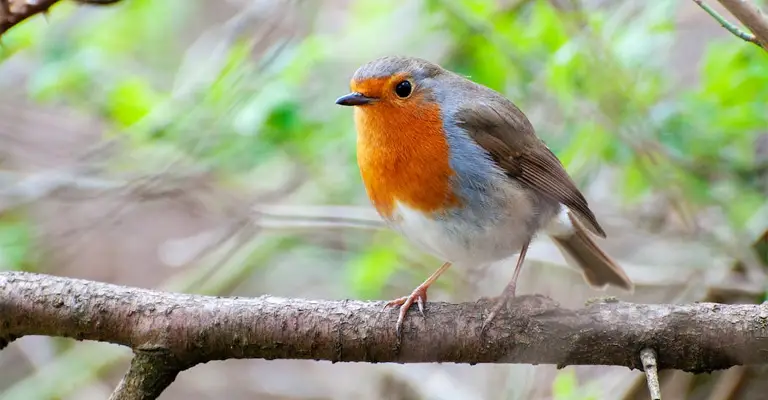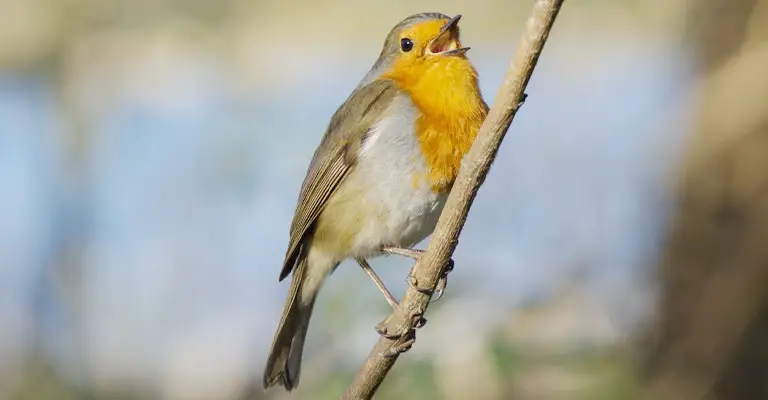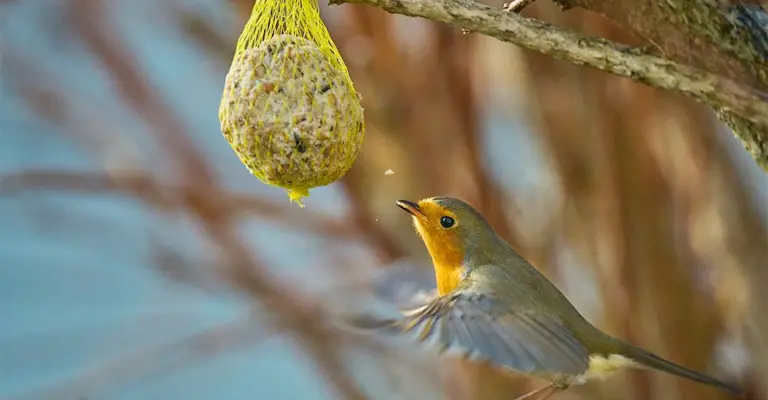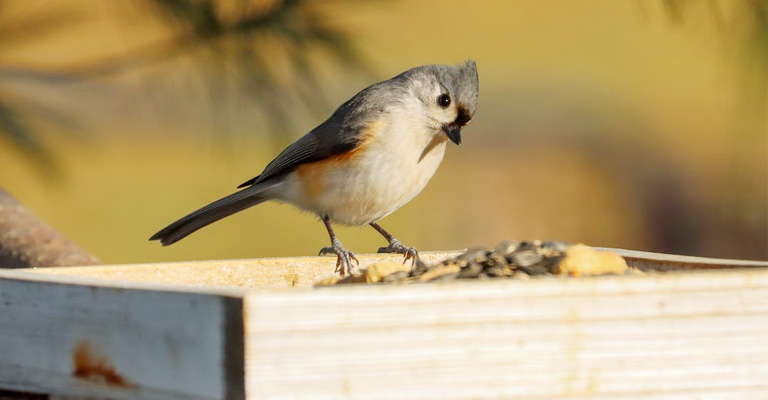In the realm of avian dietary preferences, the behavior of robins stands as a fascinating example of specialization and adaptation.
As popular backyard birds, robins are known for their vibrant plumage and melodic songs, but a curious question lingers: why don’t robins eat birdseed?
Despite the prevalence of bird feeders filled with an assortment of seeds, these iconic birds have distinct feeding habits that have evolved over time.
Unraveling the reasons behind the avoidance of bird seed by robins leads us into the intricate web of their evolutionary history, dietary needs, and ecological roles.

Why Don’t Robins Eat Bird Seed?
Robins are omnivorous birds that eat both plants and animals, but they have different preferences and adaptations than other birds that visit feeders.
Here are some reasons why robins don’t eat birdseed:
Beak Structure and Adaptations
Robins have evolved with beaks that are specifically designed for their natural diet. Their beaks are slender and slightly curved, which makes them well-suited for probing into soil, leaf litter, and grass in search of insects, worms, and other invertebrates.
This design allows them to extract their primary food sources from the ground with ease. While the beak’s shape is perfect for this kind of foraging, it may not be as effective for cracking open and consuming bird seeds.
Nutritional Requirements
Robins have nutritional needs that are best met by consuming insects, worms, and fruits. These food sources provide the essential proteins, fats, and vitamins that robins require for their high-energy lifestyle and breeding activities.
While bird seeds may offer some nutritional value, they often lack the specific nutrients that robins need to thrive. Therefore, robins have evolved to seek out their preferred food sources in order to maintain their health and vitality.
Foraging Behavior

Robins are ground foragers, meaning they search for food primarily on the ground rather than in elevated feeders where bird seeds are typically placed.
Their natural feeding behavior involves hopping, pausing, and probing the ground with their beaks to locate hidden insects and worms.
This behavior is not well-suited for pecking at seeds hanging in feeders or scattered on surfaces.
Evolutionary Adaptation
Over time, robins have evolved to exploit the ecological niches and food sources that best suit their biology and survival. This includes a preference for insects, worms, and fruits.
The specialized beak shape and feeding behaviors of robins have developed in response to these dietary preferences, which is why they may not be naturally inclined to consume bird seeds.
Availability of Preferred Foods
Insects, worms, and fruits are abundant and available throughout much of the year in the environments where robins are commonly found.
Given the availability of their preferred foods, robins have little need to rely on bird seeds for sustenance. Their diet aligns with the resources that are readily accessible to them in their natural habitats.
Robins have evolved to thrive on a diet of insects, worms, and fruits, which their specialized beak and foraging behavior are well-suited for.
While bird seeds provide sustenance for many bird species, robins are naturally adapted to seek out their preferred foods in ways that may not align with consuming bird seeds.
What Is The Best Food To Feed Robins?

Robins are omnivorous birds that eat both plants and animals, but they have different preferences and adaptations than other birds that visit feeders.
Here are some of the best foods to feed robins, along with a paragraph description for each point:
Worms And Beetles
Worms and beetles are the favorite foods of robins, as they provide them with protein and calcium. Robins have sharp eyesight and hearing that help them locate worms and beetles on the ground or under the soil.
Robins can eat earthworms, centipedes, millipedes, flies, caterpillars, termites, crickets, and grasshoppers. You can offer live or dried worms and beetles to robins in a ground feeding tray or a bird table.
Fruits And Berries
Fruits and berries are the main foods of robins in winter when insects and worms are scarce.
Fruits and berries provide them with carbohydrates, vitamins, and moisture. Robins can eat blueberries, mulberries, winterberries, juniper, honeysuckle, holly, cherries, crabapples, chokecherries, dogwood, hawthorn, grapes, and raisins.
You can offer fresh or dried fruits and berries to robins in a ground feeding tray or a bird table.
Suet And Nuts
Suet and nuts are good foods for robins in cold weather, as they provide them with fat and energy. Suet is animal fat that can be mixed with seeds, fruits, or nuts to make bird cakes or food bars.
Nuts are seeds that have a hard shell and a high oil content. Robins can eat suet, crushed peanuts, sunflower hearts, and mealworms. You can offer suet and nuts to robins in a ground feeding tray or a bird table.
These are some of the best foods to feed robins.
How To Attract Robins To A Bird Feeder?

Robins are beautiful and cheerful birds that can brighten up any backyard with their orange breasts and melodic songs.
However, they are not typical feeder visitors, as they prefer to search for food on the ground or in trees and shrubs.
Here are some tips on how to attract robins to a bird feeder:
Use A Platform Or Tray Feeder
Robins are ground feeders that like to hop around and pick up food items with their beaks.
A platform or tray feeder is the best type of feeder for robins, as it mimics their natural feeding behavior and allows them to see and access the food easily.
You can place a platform or tray feeder near one of the berry-producing trees or shrubs that robins frequent or on the ground in a safe and visible spot.
Offer Fruits And Berries
Robins love to eat fruits and berries, especially in winter when insects and worms are scarce. Fruits and berries provide them with carbohydrates, vitamins, and moisture.
You can offer fresh or dried fruits and berries to robins in a platform or tray feeder, such as raisins, apples, grapes, cherries, cranberries, blueberries, mulberries, juniper, holly, and dogwood.
Offer Mealworms Or Suet
Robins also enjoy eating mealworms or suet, especially in cold weather when they need more fat and energy. Mealworms are inch-long larvae that provide protein and calcium for robins.
Suet is animal fat that can be mixed with seeds, fruits, or nuts to make bird cakes or food bars. You can offer live or dried mealworms or suet to robins in a platform or tray feeder.
Provide Water
Robins need water for drinking and bathing, especially in winter when natural sources may be frozen. You can attract robins to your yard by providing them with a bird bath or a shallow dish of water.
Make sure the water is clean and fresh, and change it regularly. You can also add a heater or a bubbler to prevent the water from freezing.
Create Leaf Litter Piles
Robins like to search for food in leaf litter, where they can find insects, worms, and grubs. You can create leaf litter piles around your yard to attract robins.
According to the National Wildlife Federation, “Leaf litter is a natural habitat for many insects and gives grub and insect-eating birds such as robins, towhees and thrashers hours of quality snack time.”
These are some of the tips on how to attract robins to a bird feeder. They have different preferences and adaptations than other birds that visit feeders.
By offering them the right type of feeder and food, you can enjoy watching these lovely birds in your backyard.
FAQ
Robins have evolved to specialize in hunting insects, worms, and fruits, which provide the essential nutrients they need.
Their beak structure and foraging behaviors are adapted to this diet, making bird seeds less suitable for their feeding habits.
Robins have digestive systems tailored for breaking down insects and fruits. While they might ingest a few seeds accidentally, their digestive tracts are optimized for processing their natural foods, and they may not extract as much nutrition from seeds.
Yes, robins are opportunistic feeders and have a preference for live prey. Insects and worms are rich sources of proteins and fats, essential for their active lifestyles, breeding, and raising chicks. This preference has driven their beak and behavior adaptations.
Absolutely. Planting fruit-bearing trees and shrubs, maintaining gardens with insects and worms, and providing a water source can attract robins naturally.
Creating a bird-friendly habitat encourages them to thrive without the need for traditional bird seeds.
While robins are primarily insectivorous, they might occasionally consume small fruits, including berries.
However, this does not make up a substantial portion of their diet. Their evolutionary adaptation to a broader range of natural foods remains their primary nutritional strategy.
Conclusion
The mystery of why robins refrain from consuming bird seed unravels a story of finely tuned adaptation and ecological niche specialization.
Their slender, probing beaks and foraging behaviors have evolved in response to a diet rich in insects, worms, and fruits, which provide the specific nutrients necessary for their energetic lifestyle.
The beauty of the natural world lies in its diversity, and Robin’s aversion to birdseed illustrates the intricate dance of evolution, where each species finds its unique place in the tapestry of life.
As we appreciate these graceful creatures visiting our gardens and open spaces, we are reminded of the delicate balance that sustains the intricate relationships between birds, their food sources, and their habitats.